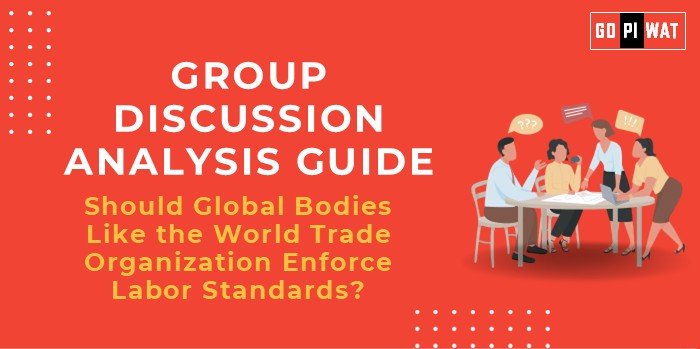📋 Group Discussion Analysis Guide: Should Global Bodies Like the World Trade Organization Enforce Labor Standards?
🌐 Introduction to the Topic
📖 Opening Context
The enforcement of labor standards by global entities like the World Trade Organization (WTO) sparks heated debates, intertwining economics, human rights, and international relations. Labor standards concern wages, working hours, safety, and rights, which vary significantly across nations due to economic and cultural differences.
📜 Topic Background
Established to promote free and fair trade, the WTO has traditionally focused on tariff reduction and trade policies. Adding labor standards to its purview could align trade with human dignity but risks controversy over economic sovereignty and enforcement feasibility. The topic gained prominence during discussions on globalization’s impact on workers in developing economies.
📊 Quick Facts and Key Statistics
- 🌍 Global Workforce: ~3.3 billion workers (ILO, 2023) – underscores the scale of potential impact.
- 👶 Child Labor: 160 million children globally (UNICEF, 2022) – highlights labor rights urgency.
- 📜 WTO Member Nations: 164 – reflects the scope of potential enforcement.
- 💰 Global GDP Contribution by Developing Nations: 41% (World Bank, 2023) – illustrates economic disparity issues.
🤝 Stakeholders and Their Roles
- 🏛️ National Governments: Policy formulation and enforcement, often balancing economic competitiveness and labor rights.
- 🏢 Multinational Corporations (MNCs): Employ large segments of the workforce; influence global supply chains.
- 🌐 International Organizations: WTO, ILO, and UN are pivotal in advocating and potentially enforcing labor standards.
- 📢 Workers’ Unions and NGOs: Push for fair labor practices, monitor compliance, and highlight abuses.
🏆 Achievements and Challenges
✨ Achievements
- 🔧 Improved Working Conditions: ILO conventions have improved global safety and wages in ratified countries.
- 🤝 Cross-Border Frameworks: Agreements like the USMCA (US-Mexico-Canada Agreement) incorporate labor standard provisions.
- 📈 Consumer Awareness: Rising demand for ethically sourced goods pressures companies to comply with labor norms.
⚠️ Challenges
- 🌐 Sovereignty Concerns: Developing nations resist external regulation, fearing reduced competitiveness.
- 🛠️ Compliance Monitoring: Practical enforcement mechanisms are complex and costly.
- 📉 Economic Disparity: Uniform standards may disproportionately burden low-income countries.
🌍 Global Comparisons
- ✅ Success: EU nations enforce strong labor standards, combining them with trade.
- ⚠️ Challenge: Bangladesh’s garment sector struggles despite international labor accords.
📖 Case Study
- 🇧🇩 Rana Plaza Tragedy (Bangladesh, 2013): Exposed the lack of safety in supply chains, leading to reforms like the Bangladesh Accord on Fire and Building Safety.
💡 Structured Arguments for Discussion
- 🛠️ Supporting Stance: “WTO enforcement of labor standards ensures a level playing field and upholds global worker rights.”
- 🛡️ Opposing Stance: “Mandating labor standards undermines sovereignty and stifles economic growth in developing nations.”
- ⚖️ Balanced Perspective: “Global enforcement of labor standards is necessary but should include flexibility for local economic contexts.”
🎯 Effective Discussion Approaches
🔑 Opening Approaches
- 📊 Statistical Impact: “160 million children still in child labor underscore the need for global enforcement.”
- 📈 Contrast Approach: “While developed nations have strong protections, 80% of garment workers in developing countries lack basic rights.”
- 📖 Case-Based: “Post-Rana Plaza reforms in Bangladesh show the need for international oversight.”
⚙️ Counter-Argument Handling
- 🔄 Acknowledge: Economic fears but highlight examples of growth paired with improved labor conditions (e.g., Vietnam’s garment industry).
🧠 Strategic Analysis of Strengths and Weaknesses
SWOT Analysis:
- 💪 Strengths: Ethical trade practices boost consumer trust. Harmonization of standards fosters fair competition.
- 🛠️ Weaknesses: Resistance from developing nations. High implementation costs for global monitoring.
- 🌟 Opportunities: Collaboration between WTO and ILO. Increased use of technology for monitoring.
- ⚠️ Threats: Trade wars stemming from non-compliance penalties. Risk of selective enforcement favoring powerful economies.
🏫 Connecting with B-School Applications
📚 Real-World Applications
- 🌍 Projects on ethical supply chains in operations management.
- 📊 Analysis of labor standards’ economic impact in trade courses.
🎓 Sample Interview Questions
- ❓ “Should labor standards be prioritized over economic growth in global trade?”
- ❓ “How can businesses balance profitability with ethical labor practices?”
💡 Insights for B-School Students
- 📈 Awareness of ethical leadership in international trade.
- ⚖️ Knowledge of economic development and social responsibility interplay.


